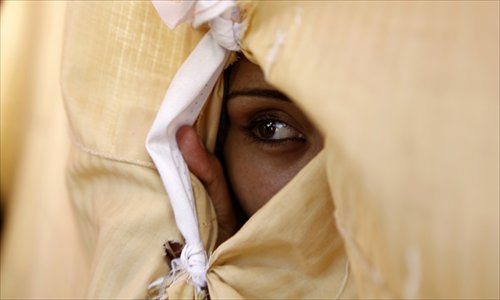HOME >> WORLD
Fighting in Gaza abates, truce fragile
Source:Agencies Published: 2014-7-28 1:13:01
Pro-Palestinian demonstrators march in London, Paris over weekend

A Palestinian woman looks on through a hole in a sheet which covers her improvised tent on Sunday in Gaza City, where displaced Palestinian families took refugee. Hamas said it has agreed to a 24-hour humanitarian truce, shortly after Israel's resumption of hostilities in Gaza. Photo: AFP
Fighting subsided in Gaza on Sunday after Hamas Islamist militants said they backed a 24-hour humanitarian truce, but there was no sign of any comprehensive deal to end their conflict with Israel.
Hamas said it had endorsed a call by the United Nations for a pause in the fighting in light of the upcoming Muslim holiday of Eid al-Fitr, expected to start in the next couple of days.
Some firing had continued after the time that Hamas had announced it would put its guns aside and Israeli Prime Minister Benjamin Netanyahu questioned the validity of the truce.
"Hamas doesn't even accept its own cease-fire, it's continuing to fire at us as we speak," he said in an interview with CNN, adding that Israel would "take whatever action is necessary to protect our people."
Nonetheless, Gaza Strip residents and Reuters witnesses said Israeli shelling and Hamas missile launches had slowly quieted down through the afternoon, suggesting a de-facto truce might be taking shape as international efforts to broker a permanent cease-fire appeared to flounder.
However, Israel's military has said it will need more time to destroy a warren of tunnels that criss-cross the Gaza border that it says is one of its main objectives.
Israel and the Hamas Islamists had agreed to a 12-hour cease-fire on Saturday to allow Palestinians to stock up on supplies and retrieve bodies from under the rubble.
Netanyahu's cabinet voted to extend the truce until midnight on Sunday at the request of the UN, but called it off when Hamas launched rockets into Israel during the morning.
Palestinian medics said at least 10 people had died in the wave of subsequent strikes that swept Gaza, including a Christian woman, Jalila Faraj Ayyad, whose house in Gaza City was struck by an Israeli bomb.
Some 1,060 Palestinians, mainly civilians and including many children, have been killed in the 20-day conflict.
Israel says 43 of its soldiers have died, along with three civilians killed by rocket and mortar fire out of the Mediterranean enclave.
The violence has sparked protests outside the region.
Thousands of demonstrators in London marched on Saturday from the Israeli Embassy to the Houses of Parliament in Whitehall, blocking traffic throughout the West End.
Demonstrators held placards reading "Stop Israeli State Terror," "Freedom for Palestine" and "Gaza - End the Siege."
Riot police fired tear gas in Paris on Saturday as tensions rose at a 5,000-strong pro-Palestinian rally that went ahead in defiance of a ban, days after similar rallies ended in violence.
Israel launched its Gaza offensive on July 8, saying its aim was to halt rocket attacks by Hamas and its allies.
After aerial and naval bombardment failed to quell the outgunned guerrillas, Israel poured ground forces into the Gaza Strip 10 days later, looking to knock out Hamas' rocket stores and destroy the vast network of tunnels.
The army says its drive to find and eliminate tunnels would continue through any temporary truce.
Diplomatic efforts led by US Secretary of State John Kerry to end the 20-day conflict have shown little sign of progress. Israel and Hamas have set conditions that appear irreconcilable.
Hamas wants an end to the Israeli-Egyptian economic blockade of Gaza before agreeing to halt hostilities. Israel has signaled it could make concessions toward that end, but only if Gaza's militant groups are stripped of their weapons.
"Hamas must be permanently stripped of its missiles and tunnels in a supervised manner," Israeli Economy Minister Naftali Bennett said.
"In return we will agree to a host of economic alleviations," the security cabinet member said on Facebook.
The main UN agency in Gaza, UNRWA, said 167,269 displaced Palestinians have taken shelter in the organization's schools and buildings.
During the lull in fighting inside Gaza on Saturday, residents flooded into the streets to discover scenes of massive destruction in some areas, including Beit Hanoun in the north and Shejaia in the east.
An Israeli official said the army hoped the widespread desolation would persuade Gazans to put pressure on Hamas to stop the fighting for fear of yet more devastation.
The Israeli military says its forces have uncovered more than 30 tunnels in Gaza.
Posted in: Mid-East